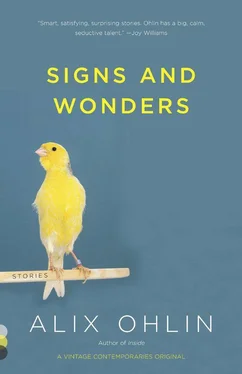Alix Ohlin - Signs and Wonders
Здесь есть возможность читать онлайн «Alix Ohlin - Signs and Wonders» весь текст электронной книги совершенно бесплатно (целиком полную версию без сокращений). В некоторых случаях можно слушать аудио, скачать через торрент в формате fb2 и присутствует краткое содержание. Год выпуска: 2012, ISBN: 2012, Издательство: Random House, Inc., Жанр: Современная проза, на английском языке. Описание произведения, (предисловие) а так же отзывы посетителей доступны на портале библиотеки ЛибКат.
- Название:Signs and Wonders
- Автор:
- Издательство:Random House, Inc.
- Жанр:
- Год:2012
- ISBN:9780307948649
- Рейтинг книги:3 / 5. Голосов: 1
-
Избранное:Добавить в избранное
- Отзывы:
-
Ваша оценка:
- 60
- 1
- 2
- 3
- 4
- 5
Signs and Wonders: краткое содержание, описание и аннотация
Предлагаем к чтению аннотацию, описание, краткое содержание или предисловие (зависит от того, что написал сам автор книги «Signs and Wonders»). Если вы не нашли необходимую информацию о книге — напишите в комментариях, мы постараемся отыскать её.
Signs and Wonders — читать онлайн бесплатно полную книгу (весь текст) целиком
Ниже представлен текст книги, разбитый по страницам. Система сохранения места последней прочитанной страницы, позволяет с удобством читать онлайн бесплатно книгу «Signs and Wonders», без необходимости каждый раз заново искать на чём Вы остановились. Поставьте закладку, и сможете в любой момент перейти на страницу, на которой закончили чтение.
Интервал:
Закладка:
A year passed, and I had a new position as an organizational consultant. I went from company to company with a laptop and a pad of yellow lined paper for taking notes. My job was to improve company performance by assessing its existing climate. I handed out questionnaires and conducted interviews, and in the process, I’d inevitably find out who was competent, overworked, or lazy, resented, or loved. Part efficiency expert, part psychiatrist, I diagnosed the health of these companies, and recommended treatment for their future well-being. Sometimes, people got fired.
I was introduced to the staff of ICS, a corporate marketing firm, by Melissa, a short, skinny woman in her thirties whose long curly hair made her look even smaller. An animal lover, she had her employees bring in pictures of their pets and post them in the lounge; this, she told me, created community. At the weekly staff meeting, she said, “This is Janet. She’ll be with us for a month or so, conducting interviews. Janet, you’re welcome to put up a picture of your pet in the lounge.”
“I don’t have any pets,” I said.
Everyone in the room shifted uncomfortably in their seats. Afterward, I was shown to my temporary office, and was looking over the departmental flowcharts when a voice said, “Janet.”
I looked up. Adam Leavitt was standing in the doorway, his hands in the pockets of his black pants. His hair was shorter, darker, with a few gray strands in it. He was wearing a white button-down shirt, and above the collar I could see the claws of his tattoo.
“You work here?” I said. I was too surprised to sound friendly, though I was happy to see him. “I didn’t notice you at the meeting.”
“I was in the back.” Stepping forward, smiling, he placed his index finger in one of the flowchart boxes on my desk. “It’s just a day job,” he said. “I still play out at night. You look good.”
“Thank you,” I said calmly, not without pride, as if he were complimenting my car.
“Let’s have lunch.”
“I just got here.”
“I didn’t mean now. I meant at lunchtime.”
“Right,” I said. On my notepad I wrote down lunch. “You can show me where to go.”
“I’ll give you all the inside dope,” he said, and before leaving he shot me a look that reminded me of college — a shade more intense, somehow, than a lunch date ought to provoke.
Three hours later we walked to a deli, bought sandwiches, and ate them sitting across the street in the kind of shoe-boxy Midtown park where corporate workers sit on or next to corporate sculpture. Depressingly, we caught up on fifteen years within ten minutes. Our lives went like this: starter job, disillusionment, graduate school, new job, major relationship, stasis. I asked him about his music, and he shrugged and muttered something about a record deal that fell through. He’d worked at ICS for five years and the line between its being a day job and an actual job had blurred to invisibility. He didn’t say he was miserable about it, but I could tell. After we finished eating he gave me a postcard advertising a show by his band, Das Boot, at a bar in Williamsburg on the weekend.
“Das Boot?” I said.
“We pretend to be German,” he said. “But we aren’t.”
“I didn’t know you spoke German.”
“I don’t. Well, sometimes I use German words, and sometimes it’s more of a German mood,” he said.
“I’m not sure I understand. What kind of words and moods?”
“Angry and guttural. Sad and guttural. Zeitgeist. Weltanschauung. Heineken.”
“Isn’t Heineken Dutch?”
“Dutch, Deutsch.” He shrugged, and I sensed he’d had this conversation before. “Anyway. It’s a hybrid Sprockets-revival faux-language poetry kind of a thing.”
I couldn’t tell if this was serious or not. I smiled noncommittally and said it sounded interesting, and he laughed.
“Well, if it’s not, at least the drinks are cheap,” he said. “Maybe you don’t care about cheap drinks at this point in your life, but will you come anyway?”
“I don’t know,” I said, catching in his eye a brief flash of disappointment that didn’t seem ironic. “I’ll try.”
I showed up alone. The bar was dirty, small, pulsing with recorded techno, and close to empty. I saw some people I vaguely knew — acquaintances from college, some in designer clothes, others in studied vintage, with uncut hair. I made chitchat, wishing I hadn’t come. Then something hit me lightly on the back of my head, and I reached back to brush away what I thought was an insect. I felt it again and looked down at the floor and noticed that I was surrounded by popcorn kernels. Someone was pelting me. I turned around and saw Adam coming at me from across the room. He literally did come right at me, his chin tucked into his neck. You know how cats walk across the room and stuff their faces right into your hand? They do it to mark you, to release some scent that shows you’ve been claimed. That’s what this was like. He took hold of my arm and said, “You came.”
“You invited me,” I said. He held out the palm of his other hand, with three wizened pieces of popcorn still left in it. I declined them, and he turned his palm over and they fell to the floor. He was wearing one of the strangest outfits I’d ever seen, a striped sailor shirt with buttons on top of the shoulders, like epaulets, and green pants with buttons all down the sides. These didn’t look like clothes bought recently, nor did they look used. I spend a fair amount of time in stores but I had no idea where a person could find such clothes. He looked half a caricature, half a heartthrob. Which is to say that when I looked at him and smiled, my heart buzzed in its cavity like a fly in a jar. Whatever advantage I had on him during the day, as a professional consultant, evaporated.
“I know,” he said in my ear, spittle hitting my left lobe and neck. “But I didn’t think — well, anyway, it’s good to see you.”
A woman with long, dyed-black hair came over and told him they were getting started, and Adam made me promise I’d stay until the end.
“Okay,” I said.
When Das Boot came on, they were so loud I thought my head would explode. I quickly tore some bar napkins into small pieces and stuffed them in my ears, feeling a million years old. Even through the paper wads I could hear Adam murmur a string of words into the microphone; it sounded like he was whispering the word polka over and over again. The woman with the long black hair hugged an accordion wildly. Behind the band, a black-and-white film I didn’t recognize was playing.
They played two or three songs — at least I think they did, but it was hard to tell when one stopped and another began. Adam never once cracked a smile, but I was pretty sure the entire thing was a big joke — maybe his response to his lack of success as a musician, or the cause of it. Or both. There were too many layers. I felt confused and out of my depth, a feeling that made me pleasantly nostalgic for college. And when he sang a song about Wiener schnitzel and Werner Herzog, I laughed. The place was small enough that he saw me laughing from the stage, and this made me happy.
Then they were finished and the recorded techno music started up, and he bounded down from the stage and came straight at me again. “What do you think?” he shouted in my ear.
I took out my napkin wads. “I don’t know,” I said. “Is that what you’re going for?”
“Absolutely,” he said. He seemed very pleased with my comment and I thought I saw him blush. I was standing close enough that I could make out the age spots and wrinkles on his face, which looked better on him, I knew, than they did on me. “Let me get you a drink,” he said.
He was known by the crowd there and people kept coming up and greeting him. I liked seeing him in his element. There were in-jokes I didn’t get and names I’d never heard, and I listened to all of it with a dopey smile on my face. After a while I realized that Adam was holding my hand. He’d just put his hand into mine without looking at me or saying anything about it, still smiling and nodding and talking to someone else. Our palms were hot and greasy, kind of gross. My heart buzzed again. I felt like I was fourteen. Is there an exact opposite to growing up? Can a person grow down ?
Читать дальшеИнтервал:
Закладка:
Похожие книги на «Signs and Wonders»
Представляем Вашему вниманию похожие книги на «Signs and Wonders» списком для выбора. Мы отобрали схожую по названию и смыслу литературу в надежде предоставить читателям больше вариантов отыскать новые, интересные, ещё непрочитанные произведения.
Обсуждение, отзывы о книге «Signs and Wonders» и просто собственные мнения читателей. Оставьте ваши комментарии, напишите, что Вы думаете о произведении, его смысле или главных героях. Укажите что конкретно понравилось, а что нет, и почему Вы так считаете.












